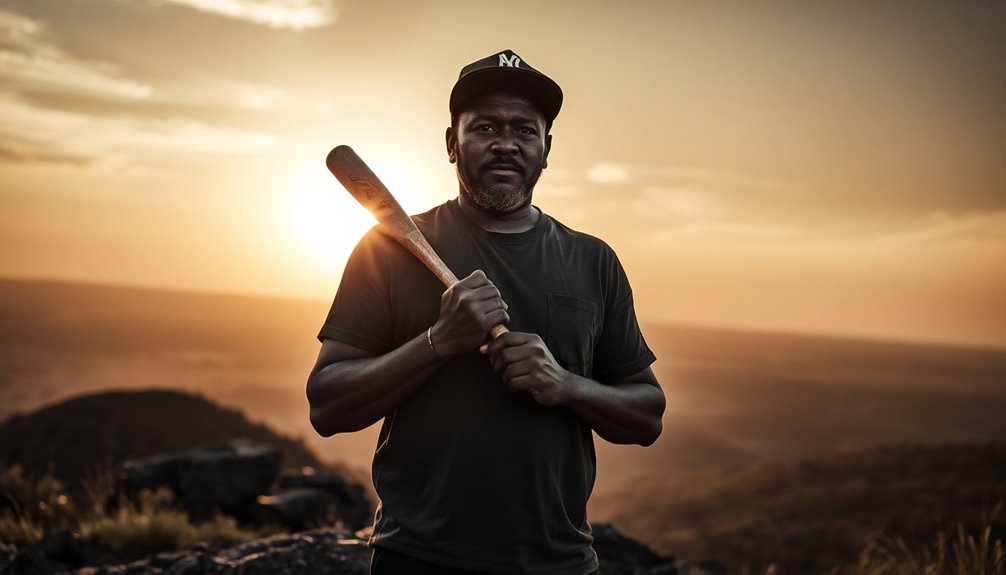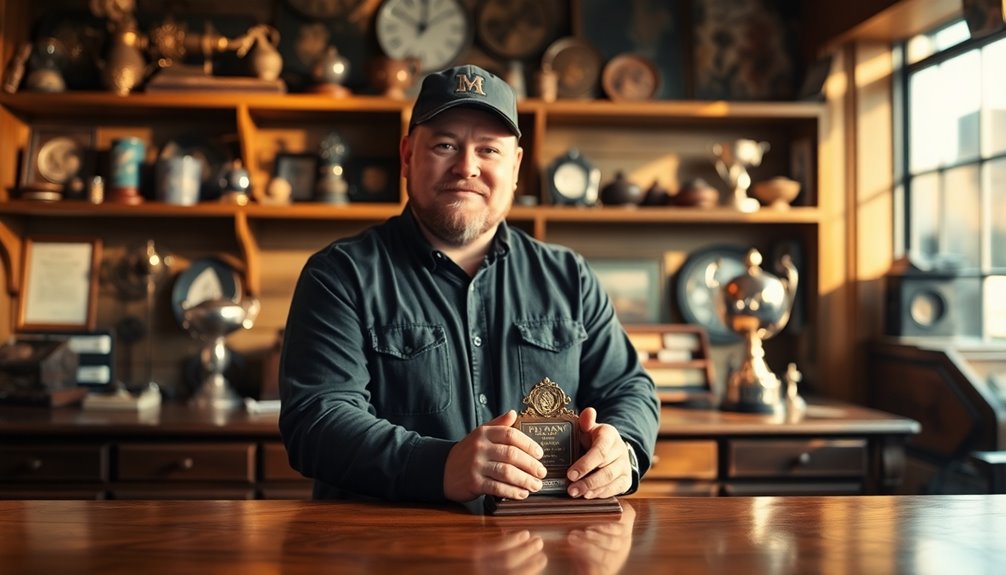Rickey Hill's life story is a remarkable tale of overcoming adversity. Born into poverty in Fort Worth, Texas, he faced severe health challenges, including a degenerative spine disorder. Despite enduring constant pain and multiple surgeries, he developed a unique swing and managed an impressive .298 career batting average in the minor leagues. Hill's determination propelled him to chase his dreams, inspiring many with his resilience and work ethic. After retiring, he advocated for diversity in sports and shared his journey through public speaking. His legacy is one of hope and perseverance, and there's much more to discover about his impactful life.
Key Takeaways
- Rickey Hill overcame severe poverty and a degenerative spine disorder, showcasing resilience from a young age.
- He developed a unique swing to excel in baseball despite constant pain and multiple surgeries.
- Hill achieved a .298 career batting average and significant success in minor leagues, demonstrating his talent and determination.
- After retiring, he became an advocate for diversity in sports, promoting inclusion and breaking racial barriers.
- Hill's legacy inspires future athletes, emphasizing perseverance and triumph against adversity throughout his life.
Early Life and Challenges

Rickey Hill's early life was marked by significant challenges that shaped his resilience and determination. Born on August 15, 1956, in Fort Worth, Texas, he grew up in a low-income family, the son of a poor Baptist preacher and his wife, Hellen. Poverty was a constant presence, often forcing the family to eat dog food and rely on homemade leg braces crafted by his parents due to financial constraints.
Rickey faced serious medical conditions from birth, including a degenerative spine disorder that left him missing a disc. By age 4, he had undergone numerous surgeries to help him walk, and he started wearing leg braces at age 5. Despite doctors doubting his ability to walk normally, he persevered through bullying and judgment from peers due to his braces. At age seven, he surprised older kids by excelling in baseball, leading to his participation in local leagues.
The Hill family frequently moved because of his father's work, which added instability to an already challenging environment. They often found themselves going door-to-door asking for food. Despite these hardships, Rickey removed his leg braces at age 8 and began to adapt to his physical limitations, balancing health issues with ambitious life goals, proving that determination can overcome even the toughest obstacles.
Passion for Baseball

Rickey Hill's passion for baseball ignited early, thanks to the inspiration he found in his family. You can see how his unique swing developed over countless hours of rigorous practice. This dedication laid the foundation for his journey through the minor leagues. Throughout his career, he demonstrated impressive defensive skills, achieving a fielding percentage of .942 across 137 games played.
Early Inspiration From Family
Growing up in a low-income family in Fort Worth, Texas, the spark of passion for baseball ignited early in Rickey Hill's life, fueled by the unwavering support of his family. Despite the hardships of poverty, including instances where they had to eat dog food from a can, Rickey's family always encouraged him to pursue his interests. His strict-but-loving father, a Baptist minister, worried about Rickey's health and potential mockery from others due to his disability, yet hoped he would follow in his footsteps.
Rickey's older brother, Robert, played a vital role in his early baseball journey. He encouraged Rickey to play with older kids, even pitching rocks for him to hit with a stick. This playful practice helped Rickey develop his impressive hitting skills. By age seven, he was already surprising teenagers with his talent, showcasing his early baseball abilities.
Throughout this challenging upbringing, Rickey's family instilled strong values and faith in him, which became essential as he faced obstacles. Each time he came to bat, he drew a cross in the dirt, feeling God's encouragement, proving that family support can fuel determination against all odds.
Unique Swing Development
Despite facing significant physical challenges, Hill carved out a unique swing that showcased his remarkable talent for baseball. Born with a degenerative spine disorder, you might think it would limit his abilities. Instead, he adapted his swing to compensate for these physical limitations, developing a strong batting technique that caught the attention of coaches early on. They recognized his keen batter's eye and impressive power, even during his initial struggles.
Starting at the Rookie level with the Lethbridge Expos in 1975, you watched as he progressed through the minor leagues, climbing to the High-A level with the Rio Grande Valley White Wings in 1976. Over the years, he consistently improved, boasting a career batting average of .298, with 26 home runs and 116 RBIs. His standout seasons included hitting .350 with 2 home runs in 34 games and achieving a .321 average with 8 home runs in 65 games with the Texas City Stars. Hill's journey ultimately led him to play for the Birmingham Barons**, a team known for developing MLB players.
Hill's unique swing not only highlighted his offensive prowess but also contributed to his reliable fielding, maintaining a .942 fielding percentage across various positions. His adaptability and passion for the game shone through at every level.
Rigorous Practice Routine
From a young age, Hill's passion for baseball fueled a rigorous practice routine that set him apart from his peers. You'd find him on the field long before and after school, honing his skills with unwavering dedication. This commitment paid off, as he began playing in local youth leagues and quickly excelled, earning accolades throughout high school. His relentless work ethic caught the attention of scouts, leading him to a tryout with the Montreal Expos at just 19, which ultimately paved the way for his draft by the Chicago Cubs in 2002.
To achieve this level of success, Hill focused on several key aspects of his training:
- Daily batting practice to refine his unique swing.
- Fielding drills to enhance his defensive skills.
- Strength training to support his physical challenges.
- Game analysis, studying his performance to identify areas for improvement.
- Mental conditioning to build resilience and focus.
Despite facing obstacles, including a degenerative spine disorder, Hill's rigorous practice routine enabled him to overcome challenges. His journey through the minor leagues showcased not just talent but an unwavering passion for the game, inspiring many to pursue their dreams regardless of the odds.
Professional Baseball Career

Rickey Hill's professional baseball journey began in 1975 with the Lethbridge Expos, where he showcased his talent across various minor league teams. Despite battling significant health challenges due to a degenerative spine disorder, he maintained an impressive career batting average of .298. His story is a tribute to resilience, as he faced tough obstacles while making a mark in the minor leagues. Emerging as a top player in major leagues later, he proved that determination could overcome adversity.
Minor League Journey
Throughout his minor league journey, Rickey Hill demonstrated remarkable resilience and talent as he navigated the challenges of professional baseball. Signing with the Montreal Expos at just 19, you'd see him start with the Lethbridge Expos in 1975. Despite hitting .217 with one home run, Rickey adjusted to the demands of the game and quickly began to shine.
- Promoted to the Rio Grande Valley White Wings in 1976, he hit an impressive .350.
- By 1977, he played for the Texas City Stars, boasting a .321 average and eight home runs.
- In 1978, with the Grays Harbor Loggers, he hit .286 and led the team to a championship.
- Over his minor league career, he recorded 205 hits and a .298 batting average.
- His performance included 26 home runs and a solid .861 OPS across four seasons.
Rickey's ability to face adversity head-on and improve each year is a reflection of his dedication to the sport. His journey through the minor leagues set the stage for a promising professional career, even as health challenges loomed on the horizon, ultimately leading to a spinal injury that cut his career short.
Health Challenges Faced
Despite his impressive talent on the field, Rickey Hill faced significant health challenges during his professional baseball career. Born with a degenerative spinal disease and missing a disc in his spine, he dealt with severe spinal issues from an early age. His legs were wrapped around each other at birth, complicating his condition, leading to numerous surgeries by age four. Although he wore leg braces until he was eight, he still managed to play baseball alongside other sports, despite facing bullying and judgment from peers.
At 17, Rickey was diagnosed with crumbling discs in his spine. By this age, his spine resembled that of a 75-year-old man, and he played in constant pain throughout his minor league career. He kept his condition a secret, but eventually, the truth surfaced, leading to his release from the team. By the late 1970s, spinal injuries forced him into retirement. Despite the challenges he faced, he maintained a mindset against quitting and persevered.
Post-baseball, Rickey underwent multiple spine surgeries and walked with a cane by age 25. Fortunately, modern medical technology allowed him to walk normally again. He later shifted to a successful career in financial planning, demonstrating his resilience and determination.
Overcoming Adversities

Overcoming adversity defined Rickey Hill's journey from a young boy facing physical challenges to a determined baseball player chasing his dreams. Born with a degenerative spinal disease, Rickey faced a world that often doubted his potential. From the age of five, leg braces were a constant reminder of his struggles, but he refused to let them define him. Instead, he channeled his energy into baseball, finding solace and joy in the game. Understanding the need for financial planning can also be crucial for pursuing dreams and managing challenges.
Despite the bullying and his father's initial reluctance, Rickey's passion persevered. With relentless determination, he pushed through pain and setbacks, driven by faith and a vision of success. Notably, after his leg braces were removed, he experienced a significant improvement in his performance. Here are some key points of his journey you can relate to:
- Embracing challenges instead of hiding from them
- Finding strength in passion and purpose
- Transforming pain into motivation for success
- Seeking support from family, despite differences
- Celebrating small victories on the path to your dreams
Rickey's story inspires you to confront your own challenges head-on and to pursue your dreams, no matter the odds stacked against you.
Post-Baseball Life

After leaving the field, Rickey Hill faced a new set of challenges as he navigated life beyond professional baseball. Retiring in 1978 due to severe back and spine issues, Rickey attempted a comeback in the San Diego Padres system in 1979. However, his back gave out during spring training, forcing him to stop. Despite these setbacks, he played in leagues across Mexico, Venezuela, and Italy, showcasing his enduring love for the game.
Rickey found purpose in coaching Little League baseball in Fort Worth, Texas, where he inspired and mentored young players. His community involvement allowed him to share valuable life lessons through the sport, keeping him connected to baseball. He also turned to faith, following in his father's footsteps as a Baptist preacher, emphasizing perseverance and resilience.
Here's a glimpse of his post-baseball life:
| Year | Activity | Impact |
|---|---|---|
| 1978 | Retired from pro baseball | Faced physical and emotional pain |
| 1979 | Attempted comeback | Back issues halted efforts |
| 1980s | Played internationally | Continued passion for the game |
| 1990s | Coaching Little League | Inspired young athletes |
| Present| Public speaking on faith | Shares his story and lessons
Legacy and Inspiration

Rickey Hill's legacy in baseball is a tribute to resilience and determination. You can see how his journey exemplifies the power of perseverance and grit. Despite facing a degenerative spine disorder, he didn't let physical limitations define him. Instead, he fought through adversity, inspiring countless athletes along the way.
- He recorded 205 hits and 26 home runs in just 201 minor league games.
- Overcame childhood challenges, removing leg braces at age seven, and rapidly improving athletically.
- Advanced from Rookie to A-Level, proving his skills were unmatched by his condition.
- Achieved a .298 batting average and maintained an OPS of .861 throughout his minor league career, which involved playing in a total of 201 games in the majors.
- Recognized as a young player with remarkable hitting ability, he serves as a beacon of hope for aspiring athletes.
Though his MLB dream was cut short, Rickey made the most of his opportunities. His story encourages you to embrace challenges and aim for your goals, no matter the odds. In remembering Rickey Hill, you celebrate not just a player, but a spirit that embodies triumph against adversity.
The Film "The Hill"

Inspired by stories of resilience like Rickey Hill's, "The Hill" presents a gripping narrative set in a British military prison during World War II. The film immerses you in the harsh, sandy environment of the Libyan desert, where a group of soldiers faces brutal punishment for offenses ranging from insubordination to profiteering. You witness their suffering under the cruel regime of Regimental Sergeant Major Wilson and his sadistic second-in-command, Staff Sergeant Williams.
As new prisoners arrive, you see them immediately subjected to humiliation and relentless punishment, forced to climb a manmade hill that symbolizes their inhumane treatment. The psychological and physical torture inflicted by the guards creates an atmosphere of despair and hopelessness. You can't help but feel for Sergeant Major Joe Roberts and other notable prisoners like Jacko King and George Stevens as they endure these horrific conditions. Connery's portrayal of Joe Roberts' defiance adds depth to the film's exploration of power dynamics and moral complexities.
Directed by Sidney Lumet, the film's powerful script and performances shine through its stark black-and-white photography. "The Hill" not only captures the brutal reality of military punishment but also serves as a reminder of the resilience of the human spirit amidst adversity.
Impact on Sports History

The impact on sports history from figures like Rickey Hill is profound, showcasing resilience and breaking barriers across multiple sports. His journey through baseball and football illustrates how determination can defy the odds and inspire future generations.
- Hill became the fourth Black player to represent England's Senior National team, paving the way for diversity.
- He played 14 years for Luton Town FC, amassing over 500 appearances, a demonstration of his skill and endurance. His contributions included being the first British South Asian to play for England at senior level. During his tenure, he exemplified the importance of strong communication skills both on and off the pitch, fostering teamwork and collaboration.
- His managerial success included leading teams to championship appearances and earning 'Coach of the Year' honors.
- Hill fought for diversity in football, developing a version of the NFL's 'Rooney Rule' to elevate Black managers in the sport.
- Despite health challenges from a degenerative spine disorder, Hill's minor league baseball career featured impressive statistics, showing that physical limitations needn't define talent.
Rickey Hill's legacy extends beyond statistics; it's about breaking barriers and inspiring others to follow their passions, no matter the obstacles. His contributions to sports history remind us that perseverance can lead to remarkable achievements.
Frequently Asked Questions
What Inspired Rickey Hill to Pursue a Life of Faith After Baseball?
You find inspiration in overcoming adversity, realizing that faith offers strength and purpose. After facing challenges in baseball, you embrace a life of service, sharing your journey to encourage others to believe in their dreams.
How Did Rickey Hill's Family Support Him During His Struggles?
You might think family struggles limit support, but Rickey's parents and brother encouraged his baseball dreams through unwavering love, even amid financial hardships. Their belief in him fueled his determination to overcome physical challenges and pursue success.
What Role Did Bullying Play in Shaping Rickey's Character?
Bullying pushed you to develop resilience and determination. Instead of letting negativity define you, it fueled your motivation to prove others wrong, shaping your character into one that thrives on overcoming challenges and pursuing dreams relentlessly.
Did Rickey Hill Have Any Mentors in His Baseball Journey?
Did you know only 10% of minor league players make it to the majors? Rickey had key mentors, like his brother Robert and supportive coaches, who nurtured his talent despite physical challenges, shaping his baseball journey.
How Has Rickey Hill's Story Influenced Aspiring Athletes Today?
Rickey Hill's story inspires you to pursue your dreams despite challenges. His resilience and determination teach you that hard work can overcome obstacles, motivating you to endeavor for excellence in your athletic journey.










